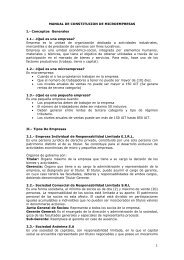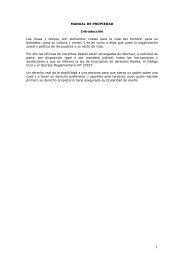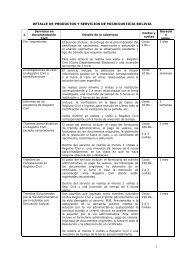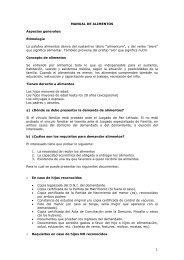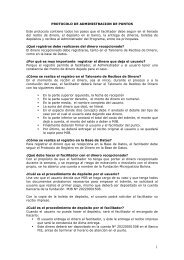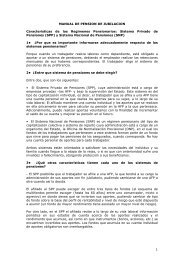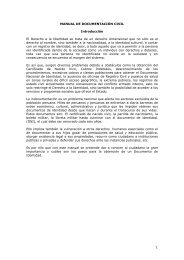ICISS report - International Coalition for the Responsibility to Protect
ICISS report - International Coalition for the Responsibility to Protect
ICISS report - International Coalition for the Responsibility to Protect
Create successful ePaper yourself
Turn your PDF publications into a flip-book with our unique Google optimized e-Paper software.
The <strong>Responsibility</strong> <strong>to</strong> <strong>Protect</strong> 64<br />
populations in <strong>the</strong> countries of a coalition. The media coverage of civilian suffering as a<br />
result of sanctions in Iraq or of airstrikes in Serbia is a new element in determining military<br />
as well as political strategies.<br />
7.37 There<strong>for</strong>e, operational planning <strong>for</strong> an operation <strong>to</strong> protect should contain a fairly<br />
detailed sub-concept <strong>for</strong> public in<strong>for</strong>mation. Proper conduct of an appropriate public in<strong>for</strong>mation<br />
campaign is not only critical <strong>to</strong> maintaining public support <strong>for</strong> an intervention but<br />
also <strong>to</strong> maintaining <strong>the</strong> cohesion of <strong>the</strong> coalition. The difficulty in designing this concept<br />
will be <strong>to</strong> reconcile <strong>the</strong> requirements of accurate, comprehensive and fast in<strong>for</strong>mation with<br />
<strong>the</strong> necessities of operational security. The cohesion of <strong>the</strong> intervening coalition and <strong>the</strong><br />
desirability of eroding <strong>to</strong> <strong>the</strong> extent possible <strong>the</strong> support <strong>the</strong> opposing leader may enjoy<br />
with his or her own people or with allies, are of crucial importance. In <strong>the</strong>se circumstances,<br />
<strong>the</strong>re should be no doubt that in contrast <strong>to</strong> war or en<strong>for</strong>cement operations in<strong>for</strong>mation<br />
will have priority over operational security, although <strong>the</strong> chances <strong>to</strong> achieve surprises will<br />
thus be fur<strong>the</strong>r reduced.<br />
FOLLOWING UP MILITARY INTERVENTION<br />
Transfer of Authority<br />
7.38 The main mission of military <strong>for</strong>ces in post-intervention operations is <strong>to</strong> provide <strong>the</strong><br />
safe environment necessary <strong>for</strong> <strong>the</strong> res<strong>to</strong>ration of good governance and <strong>the</strong> rule of law.<br />
Additionally military <strong>for</strong>ces may have <strong>to</strong> assist in reconstruction in areas which are <strong>to</strong>o<br />
dangerous <strong>for</strong> non-military personnel <strong>to</strong> enter. The conduct of such operations means often<br />
that <strong>the</strong> <strong>for</strong>ces will increasingly have <strong>to</strong> do what under normal circumstances police would<br />
do, at least initially. In addition, <strong>the</strong> <strong>for</strong>ces have <strong>to</strong> be prepared <strong>to</strong> en<strong>for</strong>ce compliance and,<br />
if necessary, <strong>to</strong> defend <strong>the</strong> country.<br />
7.39 These tasks are more complex and cover a wider range than combat operations<br />
normally do. The chain of command will be increasingly blurred since civilian authorities<br />
will often take <strong>the</strong> lead on <strong>the</strong> ground. There is a need <strong>for</strong> clear-cut responsibilities and<br />
a transition of responsibility from <strong>the</strong> military authorities <strong>to</strong> <strong>the</strong> civilian authorities, as soon<br />
as possible after hostilities have ceased. While it may be necessary <strong>for</strong> a short period<br />
immediately after hostilities have ceased <strong>for</strong> <strong>the</strong> military commander <strong>to</strong> assume complete<br />
administrative authority, <strong>the</strong> transition <strong>to</strong> civilian authority should take place with<br />
minimum delay. The usual process will be <strong>the</strong> appointment by <strong>the</strong> UN of a Special<br />
Representative of <strong>the</strong> Secretary-General, and <strong>the</strong> transfer of military authority <strong>to</strong> that Special<br />
Representative, with full local authority res<strong>to</strong>red following elections and <strong>the</strong> withdrawal of<br />
<strong>for</strong>eign military <strong>for</strong>ces.<br />
Peacekeeping and Peace Building<br />
7.40 To see an intervention through means as well that <strong>the</strong> intervening side has <strong>to</strong> be<br />
prepared <strong>to</strong> remain engaged during <strong>the</strong> post-intervention phase as long as necessary in order<br />
<strong>to</strong> achieve self-sustained stability. <strong>Coalition</strong>s or nations act irresponsibly if <strong>the</strong>y intervene<br />
without <strong>the</strong> will <strong>to</strong> res<strong>to</strong>re peace and stability, and <strong>to</strong> sustain a post-intervention operation<br />
<strong>for</strong> as long as necessary <strong>to</strong> do so.<br />
7.41 Past experience demonstrates that, if <strong>the</strong> internal security challenge is not handled<br />
early, “old” habits and structures will prevail and undermine o<strong>the</strong>r ef<strong>for</strong>ts <strong>to</strong> enhance postconflict<br />
peace building. The immediate aftermath of any civil war spawns organized crime,<br />
revenge attacks, arms proliferation, looting and <strong>the</strong>ft. UN civilian police officers deployed



